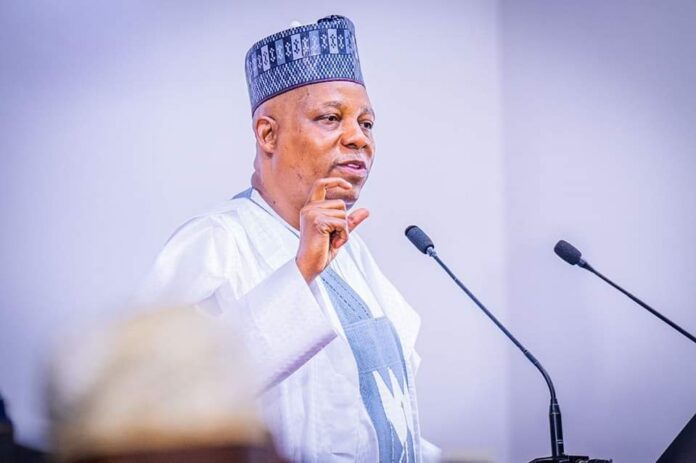The Federal Government has introduced a new financial inclusion policy aimed at transforming Nigeria into a one trillion-dollar economy by 2030.
According to the Presidency, this initiative is designed to combat poverty and drive sustainable economic growth from the grassroots level.
Vice-President Kashim Shettima unveiled the policy on Wednesday in Abuja, highlighting the administration’s commitment to enhancing financial and economic inclusion across Nigeria. The News Agency of Nigeria (NAN) reports that the Federal Government had previously launched the Aso Accord on Economic and Financial Inclusion on April 25. This comprehensive blueprint seeks to achieve universal access to financial services.
The Aso Accord is a core pillar of the administration’s Renewed Hope Agenda, which aims to turn Nigeria into a $1 trillion economy by 2030 while addressing poverty and insecurity through broad-based prosperity. The initiative focuses on providing access to capital and eradicating poverty through legislative measures and critical policies.
Vice-President Shettima emphasized that inclusive economic growth and development are central to President Tinubu’s strategies. He cited the recent upgrade of Nigeria’s credit outlook to positive by Fitch Ratings as evidence of the progress being made under President Tinubu’s reforms. While the upgrade reflects growing confidence in Nigeria’s economic trajectory, Shettima noted the administration is mindful of the short-term impacts of these reforms and is prioritizing measures to mitigate them. These measures include the Student Loan Act, which democratizes access to education, and efforts by the Federal Ministry of Agriculture and Food Security to combat food insecurity.
Shettima explained that the administration’s approach to inclusive growth must be both strategic and sustainable, which is why economic and financial inclusion has been elevated to the National Economic Council (NEC) agenda. He called on the implementation team and all stakeholders involved in the initiative to recognize the significance of their task, describing it as a vital national assignment.
Shettima expressed full confidence in their ability to bring their best efforts to ensure its success and encouraged them to contribute their insights, expertise, and dedication to develop a robust operating model that will drive economic and financial inclusion, ensuring every Nigerian has the opportunity to thrive.
Dr. Nurudeen Zauro, the Technical Advisor to the President on Financial Inclusion, reported substantial progress in implementing the Aso Accord and other initiatives aimed at broadening financial access across the nation. He acknowledged Vice-President Shettima’s support in signing and implementing the accord and noted that discussions on financial inclusion have reached the highest levels of government, including the NEC.
Zauro mentioned that since the accord’s signing, its operationalization has received funding from the Bill & Melinda Gates Foundation through the Lagos Business School (LBS). Efforts are underway to establish the operating model and legal framework to align the project with the Renewed Hope Agenda.
The team is also planning capacity-building initiatives and high-profile training for permanent secretaries and commissioners of finance to ensure practical knowledge on financial inclusion is applied where needed.
Professor Olayinka David-West, the Project Manager at Lagos Business School, praised the Tinubu administration for prioritizing economic and financial inclusion by signing the Aso Accord. She stated that the LBS team is working closely with the Vice-President’s office and other stakeholders to create a legal framework that will enhance financial inclusion in the country.



